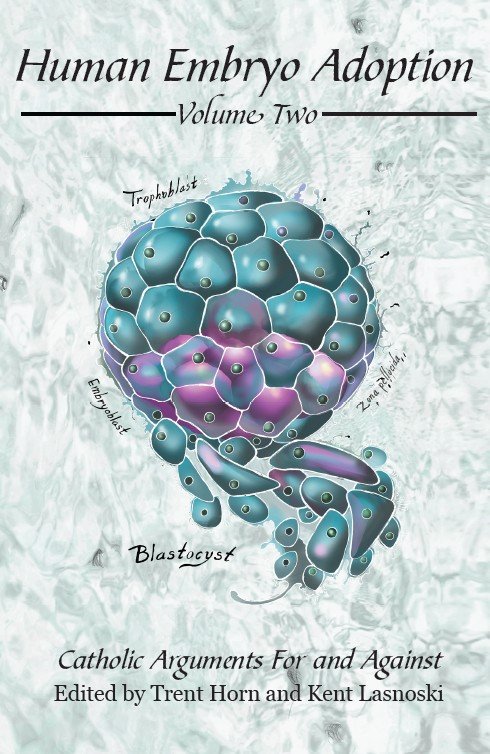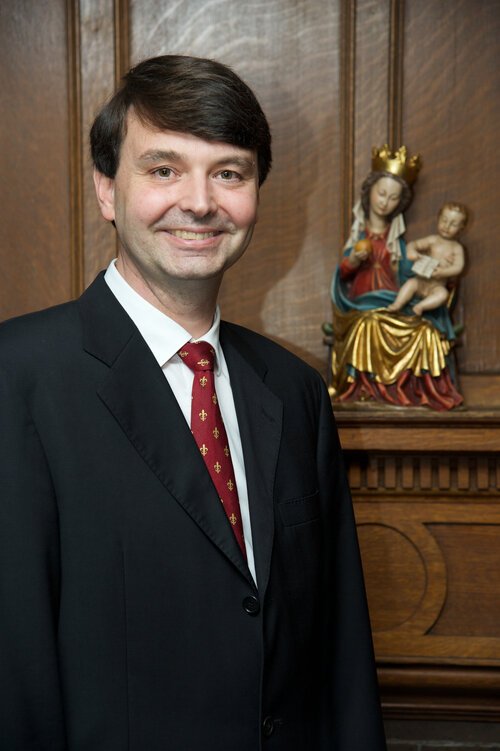Grappling with Human Embryo Adoption
To view a PDF of this document, click here.
Human Embryo Adoption, vol. 2: Catholic Arguments For and Against makes a vital contribution to the intense discussion concerning what could be ethical solutions to the tragedy of millions of human embryos imprisoned in a frozen state because of in vitro fertilization (IVF). The book represents a laudatory effort by The National Catholic Bioethics Center (NCBC) to explain the scientific context surrounding embryo adoption and the best arguments made for or against as a service to discernment for Catholics and to those who will pronounce the definitive teaching of the Church on this subject. It is sorely needed as a good resource, especially for those struggling to form their consciences and discern the best decisions to make.
Some couples have gone through the IVF process and repented but are left with frozen children in fertility clinic liquid nitrogen cooled storage tanks and need sound advice. Others are considering embryo adoption and want to do what is right but lack definitive guidance from the Church. Human Embryo Adoption provides a very complete set of arguments pro and con from a Catholic perspective based on such principles as the proper use of our sexual faculties, parenthood and the rights of the child, to interpretations from the theology of adoption, the special case of the Annunciation of the Virgin Mary, the Theology of the Body, and the works of mercy.
As Professor Janet Smith, one of the authors in favor of embryo rescue and adoption, affirms, it is somewhat unsettling that the Catholic Church has yet to decide definitively the question of the morality of embryo adoptions several decades after the practice began and in the face of a vigorous Catholic debate going back just as long. There is an urgency to this question as stated in the introduction. “Though the Church thinks in centuries, the problem of IVF and embryo freezing demands action today.”
There is no official count as to the number of human embryos in frozen storage in the USA or the world. In particular, the IVF industry in the US is so unregulated that it is has frequently been described as the “Wild West.” Estimates vary, but the total could be in the millions of cryopreserved embryos and is growing every year. The common practice of IVF centers is to conceive far more embryos in labs than could reasonably be expected to be transferred for gestation and birth. IVF was unequivocally condemned by the teaching authority of the Catholic Church in 1987 in the document Donum Vitae, but the practice has only expanded over time such that close to 90% of the couples seeking medical solutions for infertility use this technology.
In 2008, the document Dignitas Personae from the Congregation for the Doctrine of the Faith gave a partial answer to the question of what can be done with frozen embryos. First cryopreservation itself was affirmed to be incompatible with the respect owed to human embryos and donating them for scientific experimentation was forbidden as immoral. Adopting embryos as a “solution” for infertility was rejected for the same reasons that artificial heterologous procreation and surrogate motherhood are illicit. They are “contrary to the unity of marriage and to the dignity of the procreation of the human person,” as stated in Donum Vitae.
Prenatal adoption solely to save the lives of frozen children is addressed as “praiseworthy with regard to the intention of respecting and defending human life,” but presents “various problems not dissimilar to those” surrounding artificial heterologous procreation and gestational surrogacy. Pope St. John Paul II had earlier, in 1996, expressed his distress about the fate of frozen embryos and said “there seems to be no morally licit solution regarding the human destiny of the thousands and thousands of ‘frozen’ embryos which are and remain the subjects of essential rights and should therefore be protected by law as human persons.” Jimmy Akin notes in the NCBC’s book that “the idea that God would place the faithful in morally irresolvable situations in which all of the alternatives are sinful is in tension with classic Christian morality, which has held that there is always a moral solution to a situation, even if it is a difficult and costly one.”
It is fascinating to see the sheer number of arguments both from Catholic theology and bioethics that are marshalled in this book. There is consensus that IVF and the freezing of embryos are grave injustices that must be forbidden. It is also ethically unacceptable that most US jurisdictions treat embryo adoption as the transfer of “biological property.” Nevertheless, several authors engaged in the embryo adoption debate for many years, such as Fr. Nicanor Austriaco, OP, believe that an impasse has been reached where neither side is close to convincing the other at this point and a decision from the magisterium of the Church is required. This is an example of the blessing of having a teaching authority in Catholicism, but it also shows how bioethics is a cutting-edge field that is constantly raising new questions never dealt with before in human history.
The NCBC plays a vital role in assisting Catholic individuals and institutions in their discernments in conscience on complicated ethical problems. This is a real act of charity as so many are perplexed and even anguished over medical decisions that need to be made. The bishops and Church authorities have also frequently placed their trust in the NCBC to give them advice on new and complex ethical questions. Publications such as the Embryo Adoption book contribute to this vital mission. It is our sincere hope that it will help many people and ultimately those in the Roman Curia tasked with clarifying Catholic teaching to provide definite answers.
Joseph Meaney received his PhD in bioethics from the Catholic University of the Sacred Heart in Rome. His doctoral program was founded by the late Elio Cardinal Sgreccia and linked to the medical school and Gemelli teaching hospital. His dissertation topic was Conscience and Health Care: A Bioethical Analysis. Dr. Meaney earned his master’s in Latin American studies, focusing on health care in Guatemala, from the University of Texas at Austin. He graduated from the University of Dallas with a BA in history and a concentration in international studies. The Benedict XVI Catholic University in Trujillo, Peru, awarded Dr. Meaney an honorary visiting professorship. The University of Dallas bestowed on him an honorary doctorate in Humane Letters in 2022.


